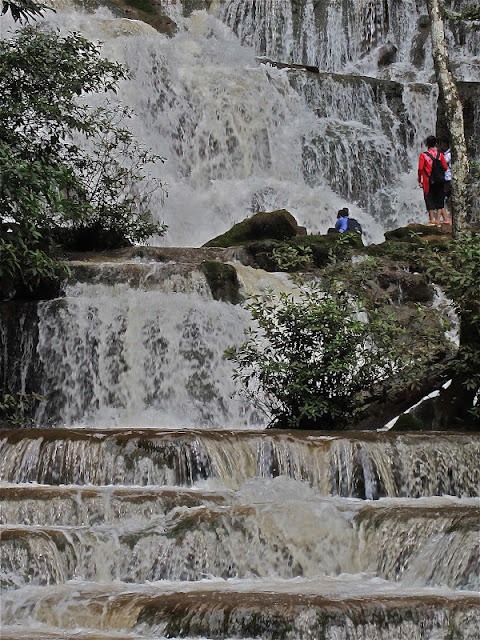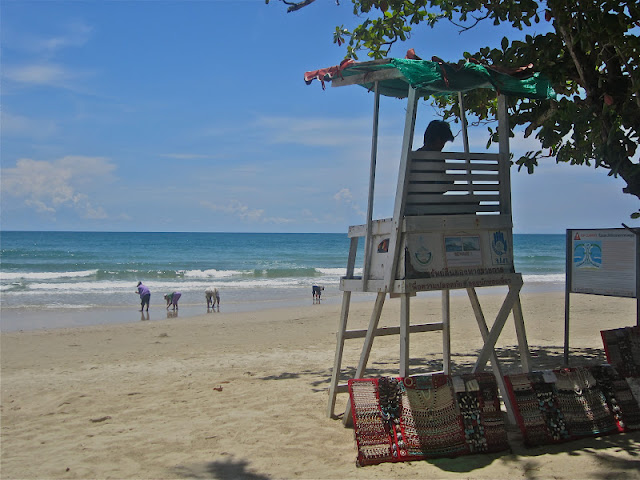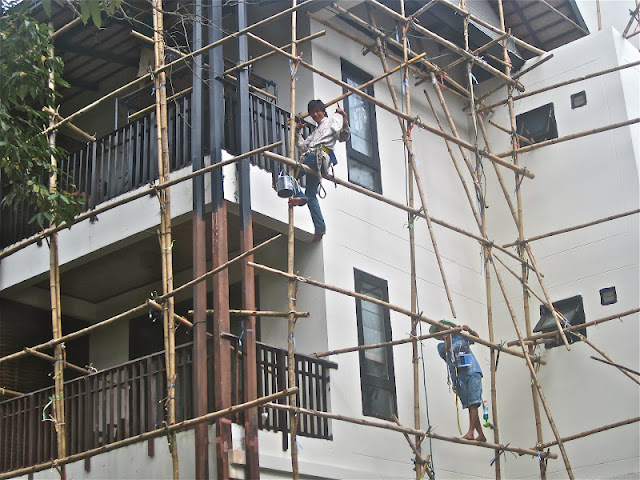 |
| Tak Province near Mae Sot with Burmese mountains in the distance |
Along the Moie River in western Thailand and eastern Burma is an area where an ethnic group known as the Karen have lived for centuries. The Karen community straddled the river, which was the life blood for irrigation, transport and commerce. Fifty years ago, the Karen and other ethnic groups experienced a great disruption to their way of life when the British drew a political boundary along the Moie between Burma and Thailand, dividing families and local communities.
Today, political instability and a government campaign to eliminate the Karen from Burma has led to a shift in population and political situation in Thailand. Thousands of Karen refugees have fled from the advancing Burmese army and now live in refugee camps in Thailand, from which they cannot leave. Others moved to Thailand to live with families or as migrant workers when the area where they lived became increasingly unsafe. Many still live in Burma but shuttle back and forth on small boats, staying clear of immigration officials in both countries. Internal politics as well as Thai-Burmese tensions have made it difficult to move freely.
Recently, we accepted an invitation to visit friends who live in a Thai Karen village (these are Thai citizens, not Burmese, refugees or migrants). Flying to Mae Sot, we spent two days touring the area, meeting with teachers of children whose parents are Burmese migrant workers in Thailand, and attending a Baptist church service (really) delivered entirely in the Karen language, followed by a birthday party and community dinner. It was an intimate look at the way of life of a people I have only heard about. I came away with a better understanding of another aspect of life in Thailand, and a new perspective on this ethnic group shared by Thailand and Burma. I use the name "Burma" rather than "Myanmar," as the latter was chosen by the repressive military government without, as my Karen friend explained, asking the people. All of the people we met referred to their homeland as Burma. However, as was also explained, when in Burma and dealing with authorities, "We use 'Myanmar' just to play it safe."
This situation is most certain to change with the official opening of the ASEAN (Association of Southeast Asian Nations) Economic Community in January 2015, as well as the increasingly democratic path being taken in Burma. In fact, one Burmese expatriate I met confidently predicted that "everyone will be able to go home before that."
 |
| I have wondered who hems all of the tarps sold everywhere in Thailand. Apparently, it is this man. |
 |
| Rice fermenting in the bed of a pickup truck. |
 |
| Detail of a typical altar depicting a revered monk. This one is on the wall of a restaurant. |
 |
| Tombs with ashes of the dead. My Thai daughter warned me that I would have bad luck for taking the photo. |
 |
| Beautiful window at a Buddhist temple in Mae Sot. |
 |
| Shop window, Mae Sot. |
 |
| Al fresco painting outside a Burmese migrant worker weaving shop in Mae Sot. |
 |
| Squat toilet with water basin for dipping flush water. |
 |
| Decorative wall art at tea house, Mae Sot. |
 |
| View from a tuk tuk, Mae Sot |
 |
| Vendor at Mae Sot night market |
 |
| Fresh batch of fried maggots. Yum! |
 |
| Chinese Buddhist temple, Mae Sot night market |
 |
| Squid kababs |
 |
| Mae Sot night market fruit vendor |
Hundreds of Burmese migrant workers come to Thailand to find seasonal work. With them come their children who their parents send to non-Thai approved Burmese schools. Although the Thai government does not recognize the schools, they are allowed to operate with Burmese teachers. The students do not receive Thai diplomas nor do they take the graduation standardized tests that are required for university attendance in Thailand. The students rarely finish high school, and those who do have a difficult time finding admission into a college or university. Talented students may receive scholarships to study for their GED and gain admission into universities in Bangkok or Chiang Mai.
Few computers are available so students do not have access to the internet. The schools are run by non profit organizations that receive donations from various sources. Some of the money goes for building materials, some for supplies, some for salaries. The teachers make an equivalent of $60US (2,000 Thai baht) a month, "If they get paid," the director of one education agency told me. Head teachers fare a bit better, making up to $150 (5,000 THB). Of the school-age migrant worker children, only 60% attend school and 3% graduate.
For information about the migrant worker schools, go to bmwec.org (Burmese Migrant Worker Education Center).
 |
| Saturday meeting of head teachers from the area near Mae Sot |
 |
| A special lunch was prepared for us in one of the teacher work rooms. This school was built by donations from New Zealand. |
 |
| Toilets provided by USAID |
 |
| Young Burmese volunteers at the school. They wear the distinctive Burmese powder on their face to shield from the sun's rays |
 |
| Washing up after lunch. |
 |
| Not far from the school is one of Thailand's most famous waterfalls, Phacharoen. |
 |
| Phacharoen has 95 levels of tumbling water. |
 |
| The church service was on the second floor of our friends' house. |
 |
| Hymns are always part of the occasion. |
 |
| Pot luck after the church service. The food seemed endless. |
 |
| A walk to the Moie River that separates Thailand and Burma. |
 |
| A huge ceremonial drum at a local Buddhist wat (temple). |
 |
| Down the street from the Baptist service, the monks had a full house too. |
 |
| Monk meditation rooms. |
 |
| Woven baskets for giving alms to monks. |
 |
| This personable young monk stopped to chat and encouraged me to wander the grounds and take photos. Are you Burmese? "No, I'm Thai." |
 |
| Side of a traditional house in the Mae Sot area: woven bamboo and leaves gathered from the forest floor. How long will it last? "Three years, or five if woven tightly." |













